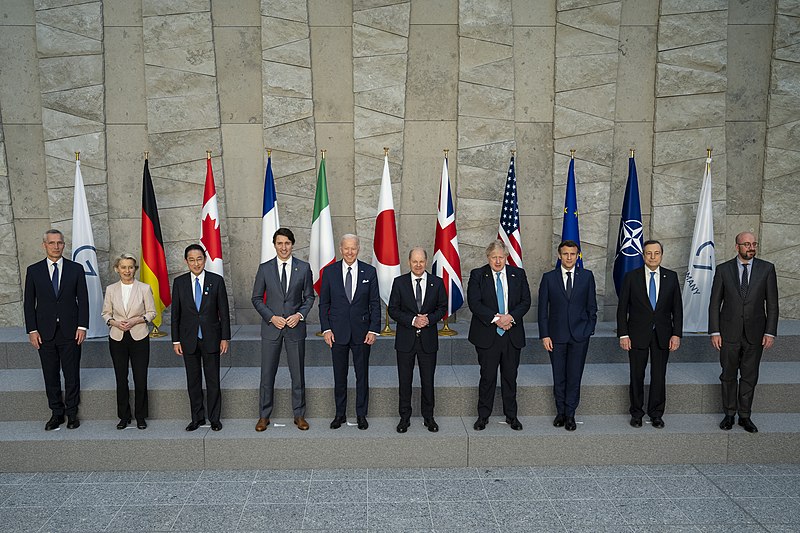Countries all over the world are experiencing the repercussions of Russia’s unprovoked invasion of Ukraine. The G7 member countries have warned that the ongoing war is causing a food and energy crisis that will disproportionately affect poorer countries.
In a meeting with top diplomats of the G7 member countries, Germany’s foreign minister Anna Baerbock said that the war Russia is waging on Ukraine is causing a “global crisis.” Baerbock explained that up to 50 million people, especially in Africa and the Middle East, would face hunger in the coming months that the war continues unless action is taken to release Ukrainian grain, which makes up a significant portion of the world’s supply.
The G7 also pledged to provide additional humanitarian aid to those who would be the most vulnerable from the war.
“Russia’s war of aggression has generated one of the most severe food and energy crises in recent history, which now threatens those most vulnerable across the globe,” said G7 said in a statement. “We are determined to accelerate a coordinated multilateral response to preserve global food security and stand by our most vulnerable partners in this respect.”
Canadian foreign minister Melanie Joly said her country is prepared to send ships to European ports for Ukrainian grain can be transported to those in need. Joly stressed to reporters that millions may face famine if the grain is not brought to countries in need.
The G7 member countries have also called on China not to provide Russia with assistance in the war, including undermining the international sanctions countries have imposed on Moscow for its invasion. They said that Beijing must respect Ukraine’s sovereignty.
The ongoing invasion of Ukraine has also resulted in Finland’s announcement of its intention to join the NATO alliance, with Sweden also expected to follow suit by applying for membership. The announcement was made Sunday by both countries, breaking from their long history of military non-alignment.
The Finnish parliament is set to endorse the decision within the coming days. A formal membership application to NATO would then be submitted to the alliance’s headquarter’s in Brussels, Belgium, at some time next week.
Sweden also took a step closer to formally announcing its desire to join NATO after the country’s ruling political party, the Social Democratic Party, voiced support to join the alliance.



 Bangladesh Election 2026: A Turning Point After Years of Political Suppression
Bangladesh Election 2026: A Turning Point After Years of Political Suppression  Japan’s Prime Minister Sanae Takaichi Secures Historic Election Win, Shaking Markets and Regional Politics
Japan’s Prime Minister Sanae Takaichi Secures Historic Election Win, Shaking Markets and Regional Politics  Federal Judge Restores Funding for Gateway Rail Tunnel Project
Federal Judge Restores Funding for Gateway Rail Tunnel Project  Trump Backs Nexstar–Tegna Merger Amid Shifting U.S. Media Landscape
Trump Backs Nexstar–Tegna Merger Amid Shifting U.S. Media Landscape  Anutin’s Bhumjaithai Party Wins Thai Election, Signals Shift Toward Political Stability
Anutin’s Bhumjaithai Party Wins Thai Election, Signals Shift Toward Political Stability  Netanyahu to Meet Trump in Washington as Iran Nuclear Talks Intensify
Netanyahu to Meet Trump in Washington as Iran Nuclear Talks Intensify  Ghislaine Maxwell to Invoke Fifth Amendment at House Oversight Committee Deposition
Ghislaine Maxwell to Invoke Fifth Amendment at House Oversight Committee Deposition  Trump Administration Appeals Court Order to Release Hudson Tunnel Project Funding
Trump Administration Appeals Court Order to Release Hudson Tunnel Project Funding  Trump Congratulates Japan’s First Female Prime Minister Sanae Takaichi After Historic Election Victory
Trump Congratulates Japan’s First Female Prime Minister Sanae Takaichi After Historic Election Victory  Ohio Man Indicted for Alleged Threat Against Vice President JD Vance, Faces Additional Federal Charges
Ohio Man Indicted for Alleged Threat Against Vice President JD Vance, Faces Additional Federal Charges  U.S. Lawmakers to Review Unredacted Jeffrey Epstein DOJ Files Starting Monday
U.S. Lawmakers to Review Unredacted Jeffrey Epstein DOJ Files Starting Monday  US Pushes Ukraine-Russia Peace Talks Before Summer Amid Escalating Attacks
US Pushes Ukraine-Russia Peace Talks Before Summer Amid Escalating Attacks  Trump Says “Very Good Talks” Underway on Russia-Ukraine War as Peace Efforts Continue
Trump Says “Very Good Talks” Underway on Russia-Ukraine War as Peace Efforts Continue  Taiwan Says Moving 40% of Semiconductor Production to the U.S. Is Impossible
Taiwan Says Moving 40% of Semiconductor Production to the U.S. Is Impossible  Nicaragua Ends Visa-Free Entry for Cubans, Disrupting Key Migration Route to the U.S.
Nicaragua Ends Visa-Free Entry for Cubans, Disrupting Key Migration Route to the U.S.  Trump Signs Executive Order Threatening 25% Tariffs on Countries Trading With Iran
Trump Signs Executive Order Threatening 25% Tariffs on Countries Trading With Iran  Bosnian Serb Presidential Rerun Confirms Victory for Dodik Ally Amid Allegations of Irregularities
Bosnian Serb Presidential Rerun Confirms Victory for Dodik Ally Amid Allegations of Irregularities 































